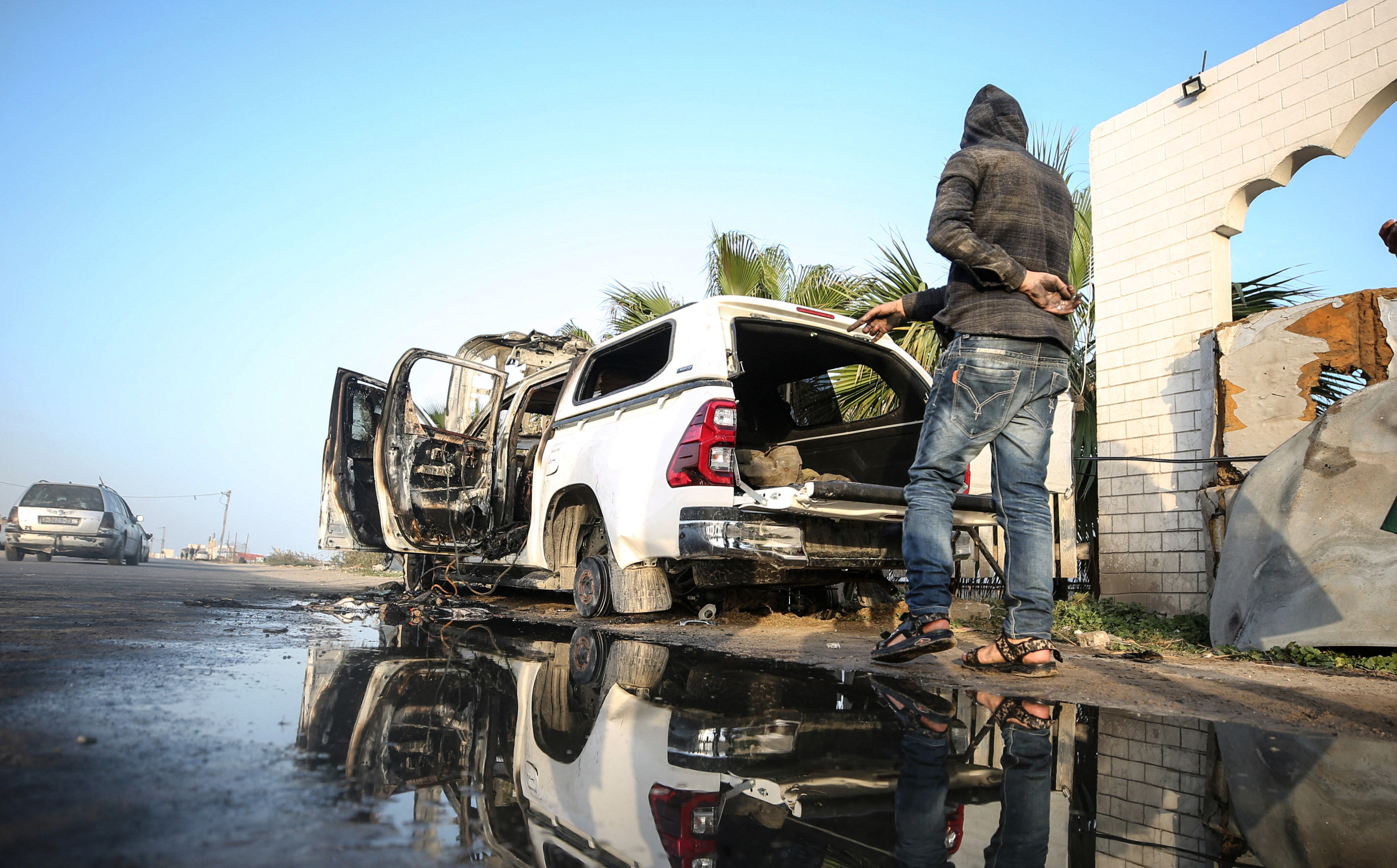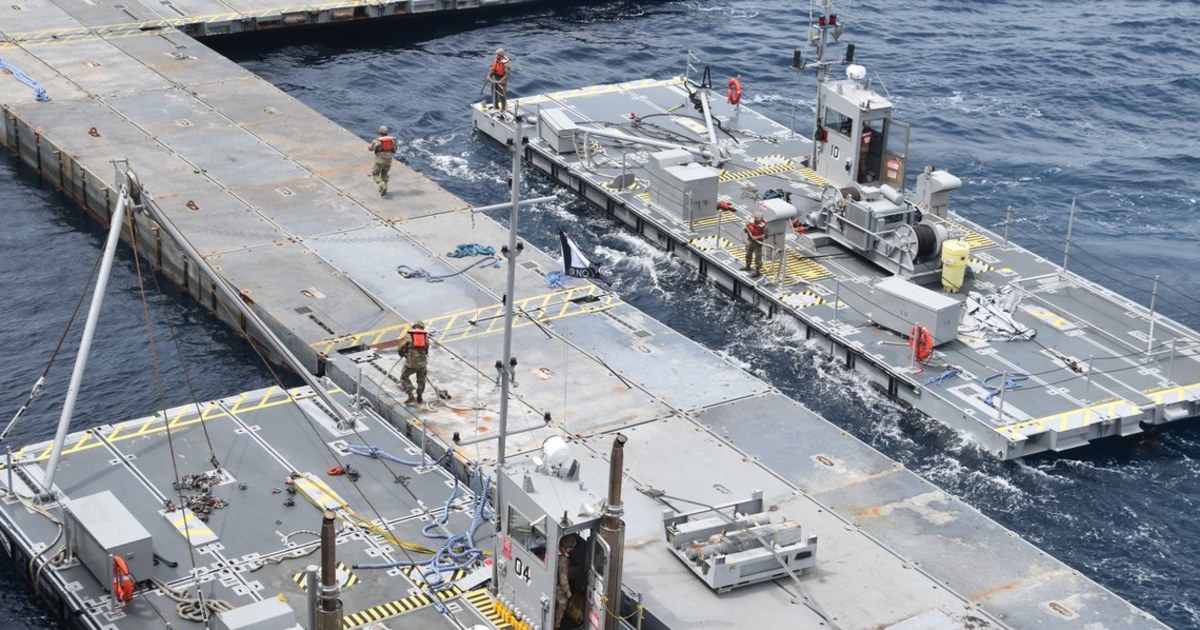Throughout its six-month war on the Gaza Strip, Israel has been accused of using food as a weapon.
“The extent of Israel’s continued restrictions on entry of aid into Gaza, together with the manner in which it continues to conduct hostilities, may amount to the use of starvation as a method of war, which is a war crime,” United Nations High Commissioner for Human Rights Volker Türk said last month. European Union foreign policy chief Josep Borrell has likewise accused Israel of using food as a “weapon of war.”
This week’s killing of several foreign aid workers by the Israel Defense Forces (IDF) has supercharged existing concerns around Israel’s alleged constriction of humanitarian aid in the Gaza Strip. There, a near-total blockade and six months of an excoriating IDF offensive have prompted a humanitarian crisis and warnings of imminent famine.
YASSER QUDIHE/Middle East Images/AFP via Getty Images
Seven World Central Kitchen (WCK) staff—including one American—were killed in a series of IDF drone strikes on their convoy this week. The workers had been delivering food along a route preagreed with the IDF. WCK founder José Andrés said his staff were targeted “systematically, car by car.”
IDF Chief of the General Staff Lt. Gen. Herzi Halevi called the incident “a grave mistake” that “followed a misidentification at night, during a war, in very complex conditions.” Israeli Prime Minister Benjamin Netanyahu said it was “a tragic event in which our forces unintentionally harmed non-combatants in the Gaza Strip.”
“This happens in war,” Netanyahu added. “We are conducting a thorough inquiry and are in contact with the governments. We will do everything to prevent a recurrence.”
A Deepening Crisis
However the strike occurred, the effect on the already-scant humanitarian inflows has been immediate. WCK and several other NGOs announced a pause in all Gaza operations, with a spokesperson for the former telling Newsweek that all of the organization’s ships had returned to Cyprus, from where it has been delivering food by sea to Gaza.
“A determination has not yet been made about when to resume operations in Gaza,” the WCK spokesperson said.
More than 180 aid workers have been killed in Gaza since October, the Associated Press reported citing United Nations figures. The dire humanitarian situation in the impoverished Gaza Strip is being exacerbated by continued Israeli action. Food—or the lack thereof—has been a bloody flashpoint in recent months.
Israel has been accused of repeatedly bombing food storage sites and delivery convoys, strikes the IDF claims have been targeting Hamas or other militant group operatives using the facilities or vehicles as cover.
Israel has reported that Hamas and other militants take control of much of the food and other aid allowed to enter the Strip, siphoning it off for use by armed formations and denying adequate access for desperate civilians.
Targeted IDF strikes have killed Gaza officials involved in organizing food distribution, figures Israel says were Hamas operatives. Food distribution points have also been subject to Israeli shooting, stampedes, and reported crossfire between the IDF and militants, with many casualties.
Newsweek has contacted the IDF spokesperson’s unit via WhatsApp to request comment.

JACK GUEZ/AFP via Getty Images
American Pressure
President Joe Biden said he was “outraged and heartbroken” by the killing of the WCK workers this week. “Israel has pledged to conduct a thorough investigation into why the aid workers’ vehicles were hit by airstrikes. That investigation must be swift, it must bring accountability, and its findings must be made public,” he added.
“Even more tragically, this is not a stand-alone incident,” the president said. “This is a major reason why distributing humanitarian aid in Gaza has been so difficult—because Israel has not done enough to protect aid workers trying to deliver desperately needed help to civilians. Incidents like yesterday’s simply should not happen. Israel has also not done enough to protect civilians.”
However, the U.S. shows no sign of pairing its political pressure on Israel with a freeze on or reduction of military aid for the IDF. State Department spokesperson Matthew Miller told journalists at a Wednesday briefing that the president’s intervention “was a statement about this incident. But it’s not a change in policy.”
The U.S., Miller added, is still pushing Israel to allow more humanitarian aid into Gaza and do more to protect aid workers and Palestinian civilians.
“I am not aware of an assessment that there is currently famine,” Miller said. “Now, there are places where we have a lack of information, particularly in northern Gaza, where it is very clear that there is acute food insecurity and there is a potential for famine.
“What’s actually occurring on the ground is very difficult to know,” Miller added. “Bottom line is there needs to be more food delivered to people who desperately need it, because if famine is not already occurring, there are at least parts of Gaza that are on the brink of famine, and we need to get food in to those people.”
Asked if Israel is deliberately targeting aid workers, Miller responded: “No, I don’t think you can necessarily make that conclusion.”

-/AFP via Getty Images
Israel launched its latest Gaza operation in response to the Hamas infiltration attack on October 7 that killed some 1,200 people and saw 257 people taken back into the Strip as hostages.
The IDF offensive has to date killed nearly 33,000 Palestinians according to the Associated Press, citing figures from the Gaza Health Ministry. At least 256 Israeli troops have been killed in the incursion.
About 1.4 million of Gaza’s 2.3 million prewar population have been displaced, the AP said. The Wall Street Journal reported in December that more than 70 percent of all homes in Gaza had been damaged or destroyed.
In the West Bank, meanwhile, at least 435 Palestinians have been killed by Israeli security forces and settlers, according to Associated Press figures. More than 8,000 have been arrested, according to the Commission of Detainees’ Affairs and the Palestinian Prisoners Society, both of which are Palestinian organizations.
Uncommon Knowledge
Newsweek is committed to challenging conventional wisdom and finding connections in the search for common ground.
Newsweek is committed to challenging conventional wisdom and finding connections in the search for common ground.















